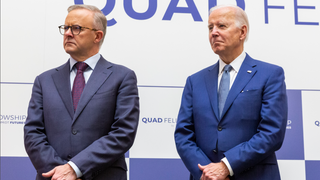The eagerly anticipated Quad Leaders’ Summit scheduled for Sydney next week will not go ahead following the announcement that President Biden has postponed his trips to Australia and Papua New Guinea to deal with a looming debt ceiling crisis in Washington.
The USSC’s Foreign Policy and Defence Research Associate, Alice Nason, discusses what this means for US-Australia priorities in the region.
What were you expecting from Australia’s first ever hosting of the Quad Leaders’ Summit?
The Quad Leaders’ Summit in Australia was poised to be consequential, not least because it would’ve been the first visit by a US head of state to Australia for 10 years. The summit’s postponement delays key announcements related to the Indo-Pacific Maritime Domain Awareness Initiative and Quad collaboration on infrastructure and climate. President Biden’s historic visit to Papua New Guinea also stood to reinforce Australia’s efforts to work closely with the United States in engaging partners in the South Pacific.
Much has been made of whether Biden's cancelled visit is a sign of US commitment to the region. Do you think US priorities are in order with this decision?
Rightly, commentators have voiced their disappointment at the summit’s cancellation. It offers a reminder that US domestic politics are perhaps the greatest spoiler for US-Asia policy.
Equally, it’s worth acknowledging that President Biden is far from the first US president to skip summits in Asia. In fact, unlike their predecessors, previous USSC research proved that the Biden administration are reliable attendees at regional summits. That reputation will not be lost over a rescheduled meeting.
Moreover, the costs of failed negotiations around the US debt ceiling would have far greater consequences for Asia than one missed summit. With cuts to Defense and State Department resources on the table in tense negotiations between the White House and Republican House Speaker Kevin McCarthy, the most helpful thing President Biden can do for Australia is prevent a potentially catastrophic debt crisis, so that he can return to business as usual in our region.






